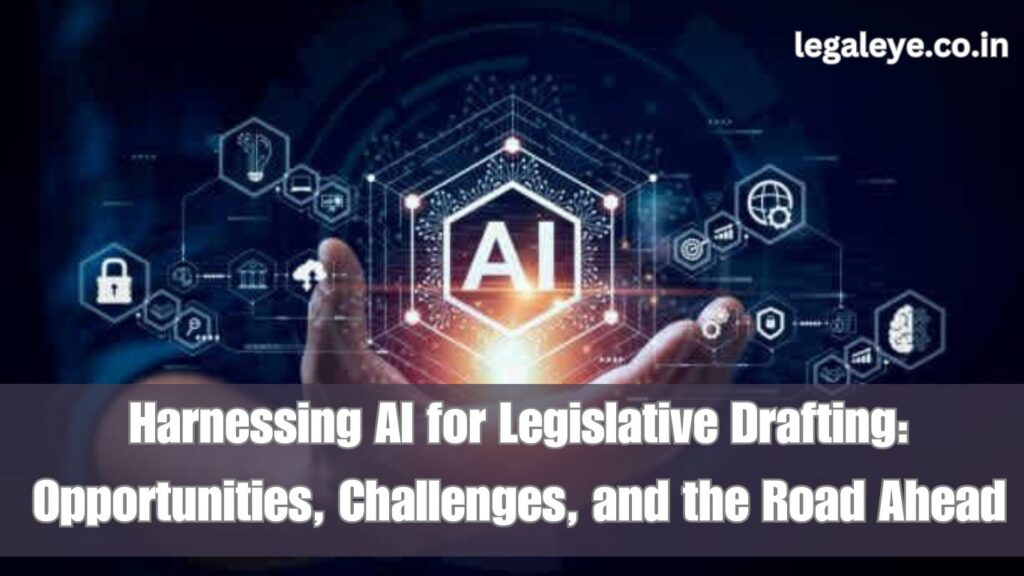
Harnessing AI for Legislative Drafting: Opportunities, Challenges, and the Road Ahead-As technology continues to evolve, artificial intelligence (AI) is playing an increasingly central role in shaping various aspects of our lives, including the legal realm. One area where AI holds significant promise is in the realm of legislative drafting. AI-assisted drafting has the potential to revolutionize the way laws are created, improving efficiency, precision, and accessibility. LegalEye Firm, with its expertise in the legal and AI fields, is at the forefront of this transformative journey. In this blog, we explore the opportunities, challenges, and the road ahead in the context of harnessing AI for legislative drafting.
Opportunities
Enhanced Efficiency: AI can streamline the legislative drafting process, automating time-consuming tasks such as structuring, formatting, and referencing legal texts. This allows legislative drafters to produce high-quality drafts more quickly.
Improved Precision: AI tools can identify potential inconsistencies, redundancies, and errors in drafts, enhancing the accuracy of legislation in areas such as criminal law and cyber law. This helps create clearer, more effective laws.
Data-Driven Insights: AI can analyze vast amounts of legal data to provide valuable insights into trends, patterns, and potential outcomes, aiding legislators in making informed decisions when drafting new laws.
Accessibility and Transparency: AI can make legislation more accessible to the public by providing easy-to-understand summaries and explanations of legal texts. This enhances transparency and promotes public engagement with the legislative process.
Enhanced Collaboration: AI tools can facilitate collaboration among legislative drafters, legal experts, and other stakeholders by providing a centralized platform for drafting, reviewing, and refining legislative texts.
Challenges
Ethical Concerns: The use of AI in legislative drafting raises ethical questions about bias, fairness, and accountability. LegalEye Firm prioritizes transparency, unbiased algorithms, and ethical standards to avoid perpetuating disparities and injustices.
Data Privacy: AI relies on large datasets to function effectively. LegalEye Firm is committed to ensuring the privacy and security of this data, especially in criminal law and cyber law drafting, where sensitive information is involved.
Complexity and Context: Legislation in criminal law and cyber law is complex and context-dependent. AI tools must grasp the nuances of legal language and context to produce effective drafts.
Human Oversight: While AI can automate many aspects of legislative drafting, human oversight is crucial to ensure that drafts align with legal, ethical, and societal standards. LegalEye Firm emphasizes striking the right balance between automation and human intervention.
Technical Limitations: AI technology is still evolving and has limitations in legislative drafting. LegalEye Firm is dedicated to continuous improvement and adaptation to fully realize the potential of AI in this context.
The Road Ahead
Collaboration and Partnerships: LegalEye Firm believes in working closely with legal professionals, legislators, AI experts, and policymakers to develop AI tools tailored to the needs of criminal law and cyber law drafting.
Regulation and Governance: Establishing clear guidelines and frameworks for AI use in legislative drafting ensures responsible and ethical application of the technology.
Education and Training: LegalEye Firm prioritizes training for legal professionals and legislators in AI technology and its applications in legislative drafting, ensuring they understand its potential and limitations.
Continuous Research and Development: LegalEye Firm is committed to ongoing research and development to improve AI tools and expand their capabilities in the context of criminal law and cyber law drafting.
Public Engagement: Engaging the public in discussions about AI use in legislative drafting builds trust and transparency. LegalEye Firm encourages public input to assess the ethical and societal implications of AI-assisted drafting.
Conclusion
Harnessing AI for Legislative Drafting: Opportunities, Challenges, and the Road Ahead-In conclusion, AI holds immense potential to transform the legislative drafting process, particularly in criminal law and cyber law, by offering opportunities for efficiency, precision, and accessibility. By addressing challenges such as ethical concerns, data privacy, and technical limitations, LegalEye Firm is dedicated to responsibly harnessing AI’s potential in legislative drafting to benefit society.

